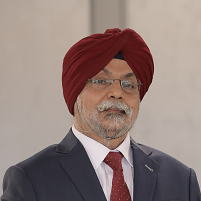How students are taught to create crisis-handling plan in Hospitality Management
Crisis of any kind can be managed or completely averted, depending upon how well one is prepared in advance, can pro-act, or can mitigate its impact by making the people at large act right at the moment the emergency strikes.
The hospitality trade and the people attached to it, directly or indirectly, by virtue of having to deal with guests from all over the world, must try to be aware of the guest behaviour, their eating preferences, their susceptibility of falling prey to the atmospheric changes, to water and the way they might react if subjected to unusual circumstances.
Inappropriate, though it may be for a person living in arid deserts to prepare himself for a situation of heavy rains or flooding, we should draw some useful learning while observing how the climatic conditions have undergone an unfamiliar change, putting these people into circumstances of having to deal with heavy rains, hurricanes or even inundation.
The hospitality trade and its institutions in India, having derived a lesson and relevant wisdom from the situation of high-level emergency in a Luxury hotel of international repute in Mumbai, took no time in introducing Disaster Management (DM) in its curriculum as one of the important modules to be covered in its management subjects.
Being soft targets, hotels and its allied service establishments are highly susceptible and the first ones to fall prey to any natural or man-made disaster, no matter the proportion of the same.
The modules of DM thus introduced are oriented towards preparing the young hotel management students for an eventuality which may just threaten the viability or integrity of operations and therefore indicate that one has a serious problem, nay, an acute crisis at hand. Conducting regular and periodic fire drills is one of the pro-actions that the hotels take towards the preparedness of its management and staff. Practical learning is derived from case studies of how different hotels dealt with such severe situations and analyze about what was right and which steps could have been avoided.
A natural or a man-made disaster of even the smallest proportion can undermine the viability of even the most prosperous, thriving and successful hospitality business. It’s an ideal exercise, a super platform to plan for the readiness so that one is prepared, no matter what the future may hold in store.
A well-updated curriculum carrying modules and plans on any kind of crisis is an important component of the management of any disaster. It can act as a guide to not only help one plan methodically but can also guide the students to work towards containing, in whatever way possible, the situation and undertaking ways and means of recovering from its impact.
India being a large, second-most populous and yet a developing economy of the world still has limited resources to wage a powerful, all-out war against such serious crises of global magnitude.
Students therefore, have to be prepared and trained to be in full communication about the threats such outbreaks can impose and should, under all circumstances be focused and highly emphatic in their actions, it is only the well-articulated and carefully structured modules that can prepare students for such sensitive situations.
Believing in the fact that ‘Crisis Communication Helps Crisis Management’, students should understand that crises as COVID-19 can be handled at different stages;
- By reinforcing in the classrooms about how this virus could attain humungous dimensions
- By suggesting remedies as prescribed by the WHO and other registered agencies
- By respecting the guidelines issued by the Ministry of Health and Family Welfare, Government of India,
- By social media and through recommendations by experts.
Communicating to the faculty members and staff during the course of any event that might have an impact on the delivery of curriculum, its student base, or even to their parents, is an extremely critical aspect. The management and containment of any crisis can be done with the collaboration between the different schools of the university with one school addressing the media, another setting up a short-term office, right until the current situation reaches a manageable level.
Sample Module Design
- Defining the crisis: Creating awareness among teachers, administrative staff and students.
- Who will manage the crisis: Creation of a task force
- What information would the task force need: All students were given task-oriented information, the results of which could be achievable.
- Identify who needs what information
- Resource mobilization: The government, so also the corporates and the various charitable organisations, matched with the contributions that benevolent people extend at large, the constraint of funds can be dealt with and sufficiently met.
- Apt communication and broadcast system: Information about “need to know” for the different stakeholders, including staff and their families, suppliers, vendors, sub-contractors and outsourced agencies, and students and their parents.
At the end of the day, it is the sheer understanding and the proper communication of the situation only that can make the students prepared for all eventualities in future…
About the author
Kulmohan Singh is a French and English language faculty at Vatel Hotel and Tourism Business School, Ansal University. He is also in-charge of industrial trainings and placements at the institute.
Note: The views expressed in this article are solely author’s own and do not reflect/represent those of Shiksha
News & Updates
Contact Details
Address
Golf Course Rd, Huda, Sushant Lok 2, Sector 55
Gurgaon ( Haryana)









